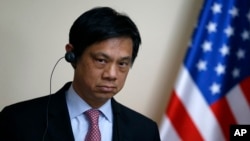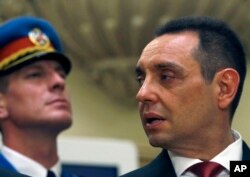Serbia's defense minister on Tuesday criticized remarks by the top U.S. diplomat in the region, who recently called on Belgrade to choose between aligning itself with either Washington and Brussels or Moscow if it intends to secure European Union status.
Addressing Serbian news outlets, Defense Minister Aleksandar Vulin, who has been known to advocate a pro-Russian stance, said comments by U.S. Deputy Assistant Secretary for European and Eurasian Affairs Hoyt Brian Yee represent "the greatest pressure against Serbia yet."
The "statement was not made by a friend or a person respecting Serbia, respecting our right to decide independently," Vulin said, calling Yee's remarks "very undiplomatic."
It was late Monday when Yee, speaking at the Serbian Economic Summit in Belgrade, said EU candidate countries should clearly demonstrate their desire to become members, and not seesaw between two sides.
Calling the U.S. Serbia's partner on the country's path toward the EU membership, "the EU hopefuls should clearly demonstrate that they really want to become members," Yee said. "You cannot sit on two chairs, especially if those chairs are too far apart."
Among the six Western Balkan countries aiming to join the EU — Serbia, Montenegro, Macedonia, Bosnia, Kosovo and Albania — Serbia may be closest to securing membership. Still recovering from a decade of wars and economic turmoil in the 1990s, however, Serbia also maintains unusually close ties with Russia.
Serbia received MIG-29 jet fighters as a "gift" from Russian president Vladimir Putin just days ago.
Yee expressed concerns that Serbia has turned only halfway toward the EU, and the other half toward Russia, adding "that countries should pick one side regardless of how difficult that might be."
Serbian President Aleksandar Vucic's office said that during a meeting Tuesday, the U.S. envoy expressed "perception that Serbia is with one foot on an EU path, and another in a union with Russia."
Vucic's office later issued a statement saying the president carefully listened to Yee's concerns and responded to his remarks "very directly."
"[Vucic] will make his answer public in the coming days," the statement said.
Jaksa Scekic, a Belgrade-based pundit and journalist who has covered Balkan affairs for more than three decades, called the statement "mixed," adding that it was "probably the best sign that it was a joint product with opinions from both sides."
"Serbia has been playing this game for a while now and this is nothing new," Scekic told VOA's Serbian Service. "The country risks staying in isolation and it has to decide. Usually after harsh rhetoric, we will probably see gifts and bribes coming from all sides. We will have to wait and see which gift Serbia will take."
Under pressure from its historic Slavic ally Russia, Serbia, like some of its Balkan neighbors, has been pressured by Russia to stay out of NATO and other Western bodies.
"It is clear from Russia's actions that it wants to have disjointed Balkans, not strong and united," Yee said.
This story originated in VOA's Serbian Service. Some information is from AP.





